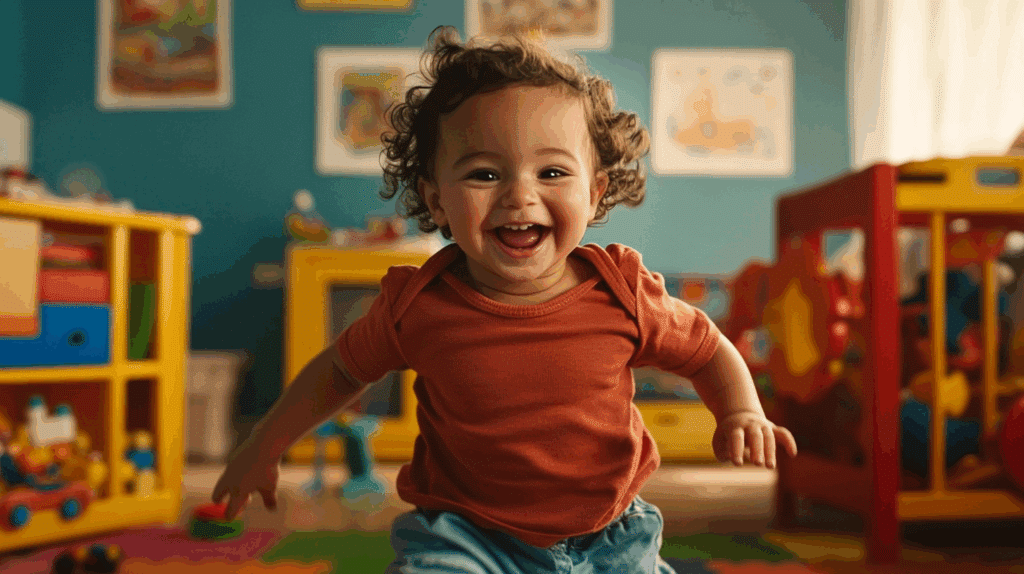Parents often worry when their active toddler runs, jumps, and plays but says few or no words. You’re not alone if you check developmental charts and feel concerned about speech delays.
Many children develop physical skills faster than verbal ones, leaving parents to wonder if there’s a problem.
We can help ease your mind with practical information and strategies. This blog breaks down common reasons for speech delays in physically active toddlers and offers clear guidance on when to seek professional help.
In the sections below, you’ll learn about typical language milestones, the connection between motor and speech development, effective communication techniques to try at home, and signs that indicate when to consult a specialist.
We’ll also share real stories from families who’ve been through similar situations and found solutions that worked for their little ones.
Common Reasons Your Very Active Toddler Is Not Talking

When a toddler zips across the room, climbs furniture with ease, and shows amazing motor skills but stays silent, parents often feel a mix of worry and confusion. The contrast between physical ability and limited speech can be striking and concerning.
The following are a few common reasons why your very active toddler is not talking:
1. Different Development Patterns
Some children focus intensely on mastering one skill set before moving to another. Your toddler might be putting all their energy into physical development right now.
Their brain are working hard on coordination, balance, and motor skills. Language skills often catch up quickly once physical milestones feel more secure. This pattern is normal and doesn’t indicate a problem with overall development.
2. Receptive vs. Expressive Language
Many active toddlers understand far more words than they can say. This gap between receptive language (what they understand) and expressive language (what they can say) is common.
Your child might follow complex instructions and recognize many objects by name but not yet have the oral motor skills or motivation to produce those same words themselves.
3. Environmental Factors
Sometimes, the home setting affects speech development. If caregivers anticipate a child’s needs before they must ask, or if older siblings speak for them, a toddler might not feel the need to talk.
Similarly, excessive screen time can reduce the back-and-forth interactions that build language skills. These factors don’t cause permanent issues but may temporarily slow verbal development.
4. Personality Traits
Some children are naturally more observant before they participate. These cautious personalities often listen and process information for longer periods before attempting speech.
They may be perfectionists who prefer to practice privately until they feel confident. This temperament trait doesn’t indicate a delay but rather a thoughtful approach to communication.
5. Hearing Concerns
Fluid in the ears, frequent ear infections, or subtle hearing issues can impact a child’s ability to process and reproduce sounds correctly.
Even mild or temporary hearing problems during critical language development periods can delay speech. Your child might hear well enough for daily activities but miss the nuances needed for language acquisition.
6. Oral Motor Challenges
Speaking requires precise coordination of the lips, tongue, jaw, and vocal cords. Some children have slight differences in muscle tone or coordination in these areas.
They might struggle with the physical aspects of forming words even though they know what they want to say. These children often use gestures effectively while working on verbal skills.
7. Family History
Speech development has strong genetic influences. If parents or siblings were late talkers who caught up without issues, your child might follow the same pattern.
About 15% of toddlers are late talkers despite normal development in other areas, and many have family members with similar early histories.
8. Bilingual Households
Children raised with multiple languages might have an initial delay in verbal expression as they sort out the different language systems. However, their comprehension often exceeds that of monolingual peers.
This temporary quiet period usually resolves as they organize their linguistic knowledge, resulting in the valuable ability to speak multiple languages.
9. Sensory Processing Differences
Some children process sensory information differently. They might be highly sensitive to sounds, textures, or other sensory inputs, making it harder to focus on language development.
These children often communicate in other ways while they work through sensory challenges. With support, they can develop effective communication skills that work with their unique processing style.
When to Worry About Your Toddler’s Speech Delay

Many parents find themselves in a tricky spot when their little one shows amazing physical abilities but stays quiet. They zoom around the house, stack blocks with perfect aim, and even solve complex toys, yet words remain few or absent.
This mix of strong physical skills and limited talking is quite normal for many children. But how do you know when to simply give it time versus when to seek help?
The following are a few reasons to worry if your toddler is not talking:
1. No babbling by 12 months
By their first birthday, most babies make sounds like “ba-ba” or “ma-ma” to try and communicate. If your child is silent or makes very few sounds by this age, it’s worth mentioning to your doctor. Early sounds form the foundation for later words.
2. No words by 16 months
Most toddlers say at least a few simple words like “mama,” “dada,” or “no” by 16 months. A complete lack of words at this point might signal the need for a closer look at your child’s speech development.
3. Fewer than 50 words by 24 months
By age two, the average toddler knows 50+ words and has started to put two words together (“more milk”). Significantly fewer words by this age might indicate a speech delay.
4. No two-word phrases by 30 months
When a child reaches two and a half years old but still uses only single words, this lag in combining words could suggest a language delay that needs attention.
5. Speech that only family members understand
By age 2, about 50% of what a child says should be clear to people outside the family. By age 3, this jumps to 75%. If others can’t grasp most of what your child says by age 3, consult a specialist.
6. Loss of previously acquired speech skills
If your child used to say certain words but has stopped using them, this regression calls for prompt medical advice. Lost skills need quick attention.
7. Limited social interaction
Speech delays paired with minimal eye contact, little interest in play with others, or not responding to their name by 12 months are signs that need professional review.
8. Family history of speech or language issues
Children with relatives who had speech problems face higher risks themselves. Being aware of this family pattern helps you monitor development more closely.
9. Trouble with basic oral movements
If your child struggles with basic actions like blowing, chewing, or making varied mouth shapes, these oral-motor issues might affect speech production and warrant assessment.
How to Seek Professional Help for Toddler Speech
If you’re concerned about your toddler’s speech, start with your family doctor or pediatrician. They can do basic checks and refer you to specialists if needed. Ask for a speech-language pathologist (SLP) referral – these experts test and treat speech issues.
Your local school district might offer free speech checks for young children through Early Intervention programs. These services often come at no cost for kids under three.
Call your health insurance to find covered speech therapists. Many plans pay for speech therapy with a doctor’s referral.
When you meet with specialists, bring notes about your child’s speech history. Include when they said first words, how many words they use, and what sounds they make or avoid.
Be ready to answer questions about family history, ear infections, and how your child plays and interacts with others. This information helps professionals make accurate assessments.
Practical Tips to Encourage Speech in Your Active Toddler

You can turn everyday moments of your toddler into speech opportunities. By working with your child’s active nature rather than fighting against it, you can create natural chances for language growth throughout the day.
Here are a few practical tips that will help your child’s speech:
- Follow their lead: Join your child in their physical play and add words to the actions. When they roll a ball, say “roll” or “ball rolling.” This connects words to activities they already enjoy, making language more meaningful and fun.
- Create communication needs: Set up situations where your child must communicate to get what they want. Place favorite toys in clear containers they can see but not open alone, or offer choices that require a response. These small moments prompt communication.
- Use movement-based songs: Action songs like “Head, Shoulders, Knees and Toes” or “The Wheels on the Bus” pair words with movements. This helps active children connect language to physical actions they enjoy, making words more memorable.
- Slow down and wait: Give your child extra time to respond after you ask a question or make a comment. Count silently to 10 before filling the silence. Many active kids need more processing time before they speak.
- Limit screen time: Replace passive screen watching with interactive play that involves both movement and language. Real-life interactions provide better speech models and more chances to practice communication than digital media.
- Narrate daily activities: Talk through regular routines like getting dressed, eating meals, or bath time. Use simple, clear sentences about what’s happening. This constant exposure to useful, context-based language builds vocabulary naturally.
- Read books that involve movement: Choose stories that let your child move, point, or make sounds. Books with flaps to lift, textures to feel, or animal noises to copy keep active toddlers engaged while building language skills.
The Bottom Line
Speech development moves at its own pace for every child. If your active toddler seems more focused on physical skills than talking, remember that many kids simply prioritize movement first.
Try the tips we’ve shared, have plenty of patience, and keep talking to your little one even when they don’t respond with words. Most importantly, trust your gut feeling. You know your child best.
Early help makes a big difference when it’s needed, so don’t hesitate to reach out to professionals if you’re worried. Many speech delays resolve with time and the right support.
If the toddler starts talking tomorrow or months from now, keep the focus on connection and communication rather than just words. The bond you build during this process matters just as much as the milestone itself















